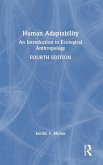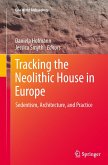The Benefits of the Cold and Domestication
A New Understanding of Human-Animal Partnerships for Thriving in Extreme Environments
Herausgeber: Stammler, Florian; Takakura, Hiroki
The Benefits of the Cold and Domestication
A New Understanding of Human-Animal Partnerships for Thriving in Extreme Environments
Herausgeber: Stammler, Florian; Takakura, Hiroki
- Gebundenes Buch
- Merkliste
- Auf die Merkliste
- Bewerten Bewerten
- Teilen
- Produkt teilen
- Produkterinnerung
- Produkterinnerung
This book explores cooperation between humans and animals in extreme environments and contends that understanding domestication is crucial to explaining how life is possible in such conditions.
Andere Kunden interessierten sich auch für
![The Domestication and Exploitation of Plants and Animals The Domestication and Exploitation of Plants and Animals]() G. W. DimblebyThe Domestication and Exploitation of Plants and Animals192,99 €
G. W. DimblebyThe Domestication and Exploitation of Plants and Animals192,99 €![Human Adaptability Human Adaptability]() Emilio F. MoranHuman Adaptability180,99 €
Emilio F. MoranHuman Adaptability180,99 €![The Domestication of Desire The Domestication of Desire]() Suzanne April BrennerThe Domestication of Desire43,99 €
Suzanne April BrennerThe Domestication of Desire43,99 €![Tracking the Neolithic House in Europe Tracking the Neolithic House in Europe]() Tracking the Neolithic House in Europe38,99 €
Tracking the Neolithic House in Europe38,99 €![The Domestication and Exploitation of Plants and Animals The Domestication and Exploitation of Plants and Animals]() G. W. DimblebyThe Domestication and Exploitation of Plants and Animals52,99 €
G. W. DimblebyThe Domestication and Exploitation of Plants and Animals52,99 €![Post-Cold War Borders Post-Cold War Borders]() Post-Cold War Borders168,99 €
Post-Cold War Borders168,99 €![Campaigning Culture and the Global Cold War Campaigning Culture and the Global Cold War]() Campaigning Culture and the Global Cold War91,99 €
Campaigning Culture and the Global Cold War91,99 €-
-
-
This book explores cooperation between humans and animals in extreme environments and contends that understanding domestication is crucial to explaining how life is possible in such conditions.
Produktdetails
- Produktdetails
- Verlag: Routledge
- Seitenzahl: 328
- Erscheinungstermin: 28. April 2025
- Englisch
- Abmessung: 240mm x 161mm x 22mm
- Gewicht: 658g
- ISBN-13: 9780367463700
- ISBN-10: 0367463709
- Artikelnr.: 72110188
- Herstellerkennzeichnung
- Libri GmbH
- Europaallee 1
- 36244 Bad Hersfeld
- gpsr@libri.de
- Verlag: Routledge
- Seitenzahl: 328
- Erscheinungstermin: 28. April 2025
- Englisch
- Abmessung: 240mm x 161mm x 22mm
- Gewicht: 658g
- ISBN-13: 9780367463700
- ISBN-10: 0367463709
- Artikelnr.: 72110188
- Herstellerkennzeichnung
- Libri GmbH
- Europaallee 1
- 36244 Bad Hersfeld
- gpsr@libri.de
Florian Stammler is Research Professor in Anthropology and coordinates the Anthropology Research Team at the Arctic Centre of the University of Lapland, Finland. He has lived with people and led research in Arctic Russia, Finland, and Greenland, and published extensively on human-animal relations, Arctic extractive industries, oral history, and youth well-being. Hiroki Takakura is a social anthropologist and Director and Professor at the Center for Northeast Asian Studies, Tohoku University, Japan. His research interests cover human-animal relations, climate change, disaster resilience, ethnicity, and arctic human history including the ethnohistory of Siberia and Northeast Asia.
1. Introduction: The Benefits of the Cold and Domestication Florian
Stammler and Hiroki Takakura Section I: Cross-Cutting Perspective on
Northern Domestication 2. The North as a Space for Innovation in
Human-Animal-Environment Adaptation Hiroki Takakura 3. Domestication and
Adaptation of Pastoral Animals and Human Livelihoods to the Arctic: An
Integrated Genetic-Anthropological Approach Juha Kantanen and Florian
Stammler Section II: Domestication Among Hunters 4. Domus-Sharing in the
Vicinity of Domestication: An Ethnography of Human-Wildlife-Land
Interactions in Interior Alaska Shiaki Kondo 5. From Relatives to Enemies:
Emplaced Evenki Relationships with Wolves in the Changing Environment of
East Siberia and the Russian Far East Donatas Brandiauskas Section III:
Convivial Ecology Embracing Animal Autonomy 6. On Encountering and Holding
Reindeer in a Convivial North David G. Anderson 7. Reindeer Riding and
Driving: A Preliminary Essay on the Use of Domesticated Reindeer for
Transportation Shiro Sasaki 8. Between Foot Rot and Wolves: The Internal
and External Threats of Tozhu Reindeer Herding Charles Stépanoff 9. Fish
Sharing between Humans and Reindeer in the Western Siberian Forest and the
Mode of Herding Yuka Oishi Section IV: Cold Domestication Beyond the Arctic
10. Traditional Ecological Knowledge (TEK) of Steppe Land for 'Dzud'
Disaster Reduction in the Mongolian Nomadic Community Takuya Soma 11.
Revisiting the Distinction between Wild and Domestic: The Relationship
between Herders and Camelids in the Central Andean Highlands of Peru Asami
Tsukuda Section V: Domestication Beyond Animals: Of Culture, Nature, and
the Law 12. Laws of Domestication and Domesticating the Law in Yakutian
Human-Animal Relations Aytalina Ivanova and Florian Stammler 13.
Domesticating Wolves While Colonizing Their Hunters: Related Patterns of
Categorization to Promote Supposed Sustainability in Northern Sweden Hugh
Beach
Stammler and Hiroki Takakura Section I: Cross-Cutting Perspective on
Northern Domestication 2. The North as a Space for Innovation in
Human-Animal-Environment Adaptation Hiroki Takakura 3. Domestication and
Adaptation of Pastoral Animals and Human Livelihoods to the Arctic: An
Integrated Genetic-Anthropological Approach Juha Kantanen and Florian
Stammler Section II: Domestication Among Hunters 4. Domus-Sharing in the
Vicinity of Domestication: An Ethnography of Human-Wildlife-Land
Interactions in Interior Alaska Shiaki Kondo 5. From Relatives to Enemies:
Emplaced Evenki Relationships with Wolves in the Changing Environment of
East Siberia and the Russian Far East Donatas Brandiauskas Section III:
Convivial Ecology Embracing Animal Autonomy 6. On Encountering and Holding
Reindeer in a Convivial North David G. Anderson 7. Reindeer Riding and
Driving: A Preliminary Essay on the Use of Domesticated Reindeer for
Transportation Shiro Sasaki 8. Between Foot Rot and Wolves: The Internal
and External Threats of Tozhu Reindeer Herding Charles Stépanoff 9. Fish
Sharing between Humans and Reindeer in the Western Siberian Forest and the
Mode of Herding Yuka Oishi Section IV: Cold Domestication Beyond the Arctic
10. Traditional Ecological Knowledge (TEK) of Steppe Land for 'Dzud'
Disaster Reduction in the Mongolian Nomadic Community Takuya Soma 11.
Revisiting the Distinction between Wild and Domestic: The Relationship
between Herders and Camelids in the Central Andean Highlands of Peru Asami
Tsukuda Section V: Domestication Beyond Animals: Of Culture, Nature, and
the Law 12. Laws of Domestication and Domesticating the Law in Yakutian
Human-Animal Relations Aytalina Ivanova and Florian Stammler 13.
Domesticating Wolves While Colonizing Their Hunters: Related Patterns of
Categorization to Promote Supposed Sustainability in Northern Sweden Hugh
Beach
1. Introduction: The Benefits of the Cold and Domestication Florian
Stammler and Hiroki Takakura Section I: Cross-Cutting Perspective on
Northern Domestication 2. The North as a Space for Innovation in
Human-Animal-Environment Adaptation Hiroki Takakura 3. Domestication and
Adaptation of Pastoral Animals and Human Livelihoods to the Arctic: An
Integrated Genetic-Anthropological Approach Juha Kantanen and Florian
Stammler Section II: Domestication Among Hunters 4. Domus-Sharing in the
Vicinity of Domestication: An Ethnography of Human-Wildlife-Land
Interactions in Interior Alaska Shiaki Kondo 5. From Relatives to Enemies:
Emplaced Evenki Relationships with Wolves in the Changing Environment of
East Siberia and the Russian Far East Donatas Brandiauskas Section III:
Convivial Ecology Embracing Animal Autonomy 6. On Encountering and Holding
Reindeer in a Convivial North David G. Anderson 7. Reindeer Riding and
Driving: A Preliminary Essay on the Use of Domesticated Reindeer for
Transportation Shiro Sasaki 8. Between Foot Rot and Wolves: The Internal
and External Threats of Tozhu Reindeer Herding Charles Stépanoff 9. Fish
Sharing between Humans and Reindeer in the Western Siberian Forest and the
Mode of Herding Yuka Oishi Section IV: Cold Domestication Beyond the Arctic
10. Traditional Ecological Knowledge (TEK) of Steppe Land for 'Dzud'
Disaster Reduction in the Mongolian Nomadic Community Takuya Soma 11.
Revisiting the Distinction between Wild and Domestic: The Relationship
between Herders and Camelids in the Central Andean Highlands of Peru Asami
Tsukuda Section V: Domestication Beyond Animals: Of Culture, Nature, and
the Law 12. Laws of Domestication and Domesticating the Law in Yakutian
Human-Animal Relations Aytalina Ivanova and Florian Stammler 13.
Domesticating Wolves While Colonizing Their Hunters: Related Patterns of
Categorization to Promote Supposed Sustainability in Northern Sweden Hugh
Beach
Stammler and Hiroki Takakura Section I: Cross-Cutting Perspective on
Northern Domestication 2. The North as a Space for Innovation in
Human-Animal-Environment Adaptation Hiroki Takakura 3. Domestication and
Adaptation of Pastoral Animals and Human Livelihoods to the Arctic: An
Integrated Genetic-Anthropological Approach Juha Kantanen and Florian
Stammler Section II: Domestication Among Hunters 4. Domus-Sharing in the
Vicinity of Domestication: An Ethnography of Human-Wildlife-Land
Interactions in Interior Alaska Shiaki Kondo 5. From Relatives to Enemies:
Emplaced Evenki Relationships with Wolves in the Changing Environment of
East Siberia and the Russian Far East Donatas Brandiauskas Section III:
Convivial Ecology Embracing Animal Autonomy 6. On Encountering and Holding
Reindeer in a Convivial North David G. Anderson 7. Reindeer Riding and
Driving: A Preliminary Essay on the Use of Domesticated Reindeer for
Transportation Shiro Sasaki 8. Between Foot Rot and Wolves: The Internal
and External Threats of Tozhu Reindeer Herding Charles Stépanoff 9. Fish
Sharing between Humans and Reindeer in the Western Siberian Forest and the
Mode of Herding Yuka Oishi Section IV: Cold Domestication Beyond the Arctic
10. Traditional Ecological Knowledge (TEK) of Steppe Land for 'Dzud'
Disaster Reduction in the Mongolian Nomadic Community Takuya Soma 11.
Revisiting the Distinction between Wild and Domestic: The Relationship
between Herders and Camelids in the Central Andean Highlands of Peru Asami
Tsukuda Section V: Domestication Beyond Animals: Of Culture, Nature, and
the Law 12. Laws of Domestication and Domesticating the Law in Yakutian
Human-Animal Relations Aytalina Ivanova and Florian Stammler 13.
Domesticating Wolves While Colonizing Their Hunters: Related Patterns of
Categorization to Promote Supposed Sustainability in Northern Sweden Hugh
Beach








